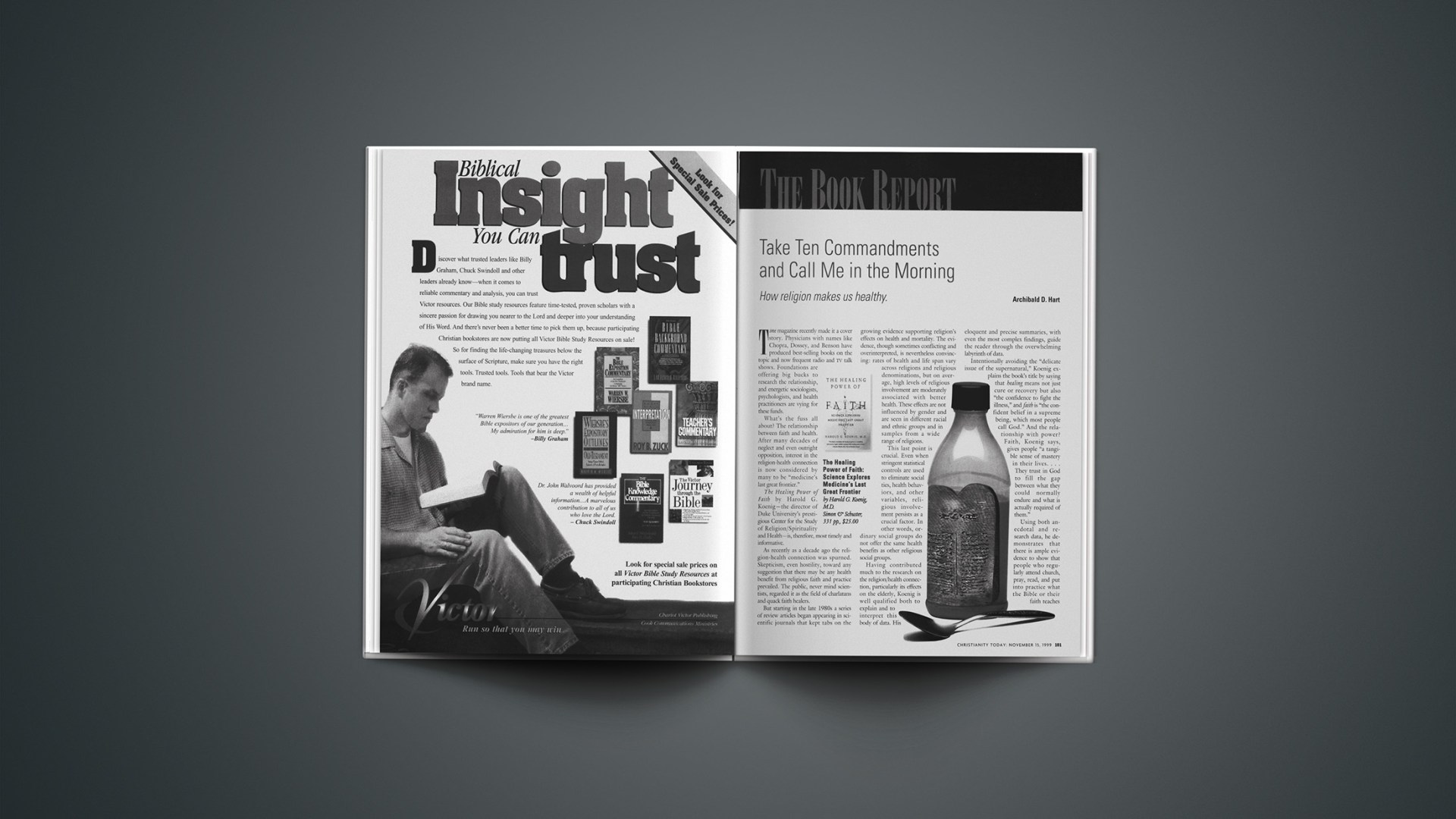Time magazine recently made it a cover story. Physicians with names like Chopra, Dossey, and Benson have produced best-selling books on the topic and now frequent radio and TV talk shows. Foundations are offering big bucks to research the relationship, and energetic sociologists, psychologists, and health practitioners are vying for these funds.
What’s the fuss all about? The relationship between faith and health. After many decades of neglect and even outright opposition, interest in the religion-health connection is now considered by many to be “medicine’s last great frontier.”
The Healing Power of Faith by Harold G. Koenig—the director of Duke University’s prestigious Center for the Study of Religion/Spirituality and Health—is, therefore, most timely and informative.
As recently as a decade ago the religion-health connection was spurned. Skepticism, even hostility, toward any suggestion that there may be any health benefit from religious faith and practice prevailed. The public, never mind scientists, regarded it as the field of charlatans and quack faith healers.
But starting in the late 1980s a series of review articles began appearing in scientific journals that kept tabs on the growing evidence supporting religion’s effects on health and mortality. The evidence, though sometimes conflicting and overinterpreted, is nevertheless convincing: rates of health and life span vary across religions and religious denominations, but on average, high levels of religious involvement are moderately associated with better health. These effects are not influenced by gender and are seen in different racial and ethnic groups and in samples from a wide range of religions.
This last point is crucial. Even when stringent statistical controls are used to eliminate social ties, health behaviors, and other variables, religious involvement persists as a crucial factor. In other words, ordinary social groups do not offer the same health benefits as other religious social groups.
Having contributed much to the re search on the religion/health connection, particularly its effects on the elderly, Koenig is well qualified both to explain and to interpret this body of data. His eloquent and precise summaries, with even the most complex findings, guide the reader through the overwhelming labyrinth of data.
Intentionally avoiding the “delicate issue of the supernatural,” Koenig explains the book’s title by saying that healing means not just cure or recovery but also “the confidence to fight the illness,” and faith is “the confident belief in a supreme being, which most people call God.” And the relationship with power? Faith, Koenig says, gives people “a tangible sense of mastery in their lives. … They trust in God to fill the gap between what they could normally endure and what is actually required of them.”
Using both anecdotal and research data, he demonstrates that there is ample evidence to show that people who regularly attend church, pray, read, and put into practice what the Bible or their faith teaches are overall healthier. Just for starters, they have significantly lower blood pressure, are hospitalized less, recover from surgery faster, have stronger immune systems, and are likely to live longer. Emotional health also benefits: family life is better and depression is lower in those with faith.
One example: the Duke research center found that “people who went to church regularly had significantly lower blood levels of interleukin-6 (IL-6), which rises with unrelieved chronic stress.” In other words, churchgoers seem to have stronger immune systems.
And it doesn’t seem to matter what type of religious faith one practices. Any religious involvement is beneficial to some degree. Koenig’s research, as well as that of other researchers, shows that “religiousness” is the kingpin—though there are some interesting differences related to denominational affiliation: for example, Mormons and Adventists score high on almost all factors. Conservative Protestants have lower cancer risks than liberal Protestants, and Jewish people have the highest cancer death rates.
The research does raise some questions. For example, are the health benefits of religion caused in large part by the lifestyle and general beliefs generated by all religions? Diet (especially the avoidance of nicotine and alcohol), moral codes, coping styles, meditation, and many other specifically religious factors and behaviors need to be pinpointed in future studies.
Koenig insists that research can neither prove nor disprove the reality of answered prayers or divine intercession. His interest is “merely to explore and chart in a scientific manner the effect of religious faith and practice on physical and emotional health.”
Just as well, because it is bad theology to see God as a dependent variable in an experiment. Kierkegaard wisely warned us that “to be known directly is the mark of an idol.”
Furthermore, the Christian life, lived as Christ would desire, is neither easy nor necessarily conducive to longevity. Christ, Paul, and many others died pretty early. If this research teaches us anything, it is that one cannot judge the value of a particular religion solely by whether it prolongs life.
While affirming Koenig’s suggestions on how people can achieve a greater level of physical and emotional health (including having church-based wellness centers), such research could benefit from an infusion of some strong theological medicine. Life and death, as well as health and suffering, cannot be totally understood outside of a true, saving faith in a real and living God.
Archibald D. Hart is professor of psychology at the Graduate School of Psychology at Fuller Theological Seminary.











